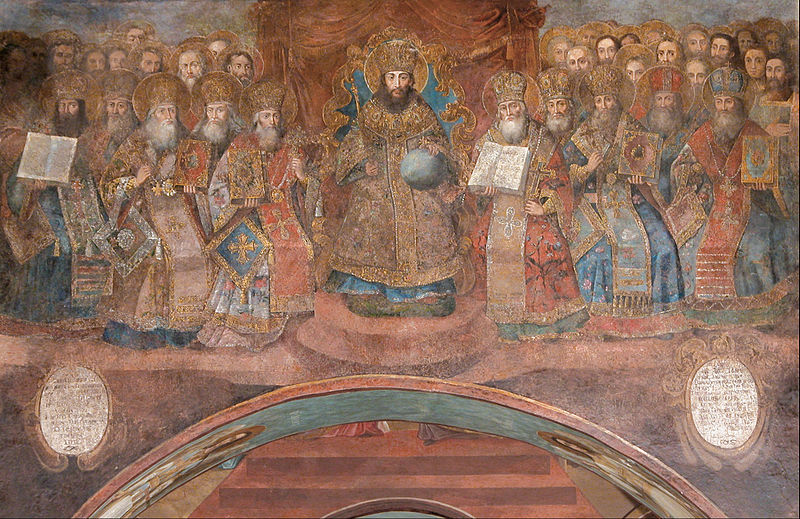George Hunsinger's book, Eucharist and Ecumenism: Let Us Keep the Feast (Current Issues in Theology), is a magisterial work on both the Eucharist and on Ecumenism. It's significantly changed how I view other Christian Church traditions, and caused me to embrace Transelementation as the the correct view of Real Presence in the Lord's Supper.
In a personal letter near the end of Karl Barth's life, he said we should remain in the Church where our eyes were first opened to Christ. I've always struggled to understand it, but Hunsinger's book has significantly clarified the problem of Ecumenism.
The following two quotations from the opening of Eucharist and Ecumenism describe two approaches to Ecumenism. In the first example we may Hope for the fulfillment of Jesus's prayer: "that they may all be one. As you, Father, are in me and I am in you, may they also be in us,[f] so that the world may believe that you have sent me." (John 17:21 NRSV). And with the second quotation, we may learn to oppose the divisiveness of "Return Ecumenism" and all its forms whether fundamentalist or liberal or Western or Eastern that seeks to divide the body of Christ, so that we all may believe the Nicene Creed together when it says "We believe in the one holy catholic and apostolic church".
Quotation #1: George Hunsinger on how a divided church is intolerable:
As an undergraduate I took a course on the Ecumenical Movement from Robert McAfee Brown, who had been an observer in Rome during Vatican II. It was Brown who first made me see that a divided church was intolerable, though I remained skeptical about solutions. When I went to seminary, the Jesuits saved my theological education. Frs. Gerald O’Collins and George W. MacCrae of the Weston School of Theology combined piety and learning in a way that often seemed lacking in the ethos across the commons at the divinity school where I was enrolled. For a young Presbyterian ministerial student, it was an exercise in practical ecumenism. Then during my doctoral studies, by the sheer force of his example and teaching, another former observer in Rome, George A. Lindbeck, made the ecumenical agenda seem inescapable, though for me it remained a matter of peripheral vision, as I was more preoccupied in those days with the sorrows and outrages of an unconscionable war.
The virtues of Mercersberg theology for the Reformed tradition, with its effort to retrieve a more catholic understanding of the eucharist through the work of John Nevin, were kept before my eyes by Howard G. Hageman, president of New Brunswick Theological Seminary, where I obtained my first academic post. Of course I had no idea at the time that these influences might be leading anywhere. Looking back, it seems that the turning point came in 1995 during a Lenten Bible study in my local congregation. Feeling that my New Testament Greek, never very good, was getting ever more rusty by the day, I took an interlinear volume with me to one of the sessions. To my surprise the word koinonia showed up in 1 Cor. 10:16. Could it be, I wondered, that the relationship between the bread and Christ’s body might be one of mutual indwelling? Over time my hunch was reinforced by Luther, confirmed by Vermigli, and validated by Kasemann. I was headed down the trail that led to this book.
George Hunsigner, Eucharist and Ecumenism, pg vii-viii
Quotation #2: George Hunsinger on the danger of Enclave Theology:
By “enclave theology,” I mean a theology based narrowly in a single tradition that seeks not to learn from other traditions and to enrich them, but instead to topple and defeat them, or at least to withstand them. Enclave theology is polemical theology even when it assumes an irenic fac ̧ade. Its limited agenda makes it difficult for it to take other traditions seriously and deal with them with fairly. Whether openly or secretly, it is not really interested in dialogue but in rec- titude and hegemony. It harbors the attitude that the ecumenical movement will succeed only as other traditions abandon their fundamental convictions, where they are incompatible with those of the enclave, in order to embrace the enclave’s doctrinal purity. Because of its temptation to misrepresent or devalue traditions with which it disagrees, such theology is finally divisive and futile. With little chance of success beyond those already convinced, it mainly reinforces the ecumenical status quo. Enclave theology makes itself look good, at least in its own eyes, by making others look bad. It is in danger of what Paul rejected as “party spirit” or “works of the flesh,” namely, enmity, strife, and factionalism (Gal 5:20). In the ecumenical churches no tradition or communion is immune from this kind of dogmatism.
George Hunsigner, Eucharist and Ecumenism, pg 1
Related: catholic and apostolic Church, Ecumenical, Ecumenism, Eucharist and Ecumenism, Eucharist and Ecumenism: Let Us Keep the Feast (Current Issues in Theology), George Hunsinger, holy, Karl Barth, Nicene Creed, One, Unity




Leave a comment